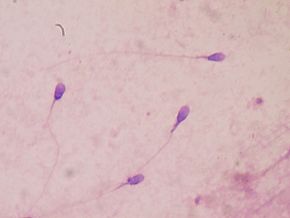 The following article in a popular magazine follows up on research that came out last year about the alarming steep decline in male sperm counts and sperm concentration over the past few decades. This is true for the U.S., Europe, Australia, New Zealand, and it is thought world wide. The article discusses the causes: environmental chemicals and plastics, especially those that are endocrine disruptors (they disrupt a person's hormones!). These chemicals are all around us, and we all have some in our bodies (but the amounts and types vary from person to person). Some examples of such chemicals are parabens, phthalates, BPA and BPA substitutes.
The following article in a popular magazine follows up on research that came out last year about the alarming steep decline in male sperm counts and sperm concentration over the past few decades. This is true for the U.S., Europe, Australia, New Zealand, and it is thought world wide. The article discusses the causes: environmental chemicals and plastics, especially those that are endocrine disruptors (they disrupt a person's hormones!). These chemicals are all around us, and we all have some in our bodies (but the amounts and types vary from person to person). Some examples of such chemicals are parabens, phthalates, BPA and BPA substitutes.
Even though there are effects from these chemicals throughout life, some of the worst effects from these chemicals seem to be during pregnancy - with a big effect on the developing male fetus. Testosterone levels in men are also dropping. Bottom line: males are becoming "less male", especially due to their exposure to all these chemicals when they are developing before birth (fetal exposure). Since it is getting worse with every generation of males, the concern is that soon males may be unable to father children because their sperm count will be too low - infertility. Dogs are experiencing the same decline in fertility!
Why isn't there more concern over this? What can we do? We all use and need plastic products, but we need to use safer chemicals in products, ones that won't mimic hormones and have endocrine disrupting effects. Remember, these chemicals have more effects on humans than just sperm quality (here and here). While you can't totally avoid plastics and endocrine disrupting chemicals, you can definitely lower your exposure. And it's most important before conception (levels of these chemicals in both parents), during pregnancy, and during childhood.
Do go read the whole article. Excerpts from Daniel Noah Halpern's article in GQ: Sperm Count Zero
A strange thing has happened to men over the past few decades: We’ve become increasingly infertile, so much so that within a generation we may lose the ability to reproduce entirely. What’s causing this mysterious drop in sperm counts—and is there any way to reverse it before it’s too late?
Last summer a group of researchers from Hebrew University and Mount Sinai medical school published a study showing that sperm counts in the U.S., Europe, Australia, and New Zealand have fallen by more than 50 percent over the past four decades. (They judged data from the rest of the world to be insufficient to draw conclusions from, but there are studies suggesting that the trend could be worldwide.) That is to say: We are producing half the sperm our grandfathers did. We are half as fertile.
The Hebrew University/Mount Sinai paper was a meta-analysis by a team of epidemiologists, clinicians, and researchers that culled data from 185 studies, which examined semen from almost 43,000 men. It showed that the human race is apparently on a trend line toward becoming unable to reproduce itself. Sperm counts went from 99 million sperm per milliliter of semen in 1973 to 47 million per milliliter in 2011, and the decline has been accelerating. Would 40 more years—or fewer—bring us all the way to zero?
I called Shanna H. Swan, a reproductive epidemiologist at Mount Sinai and one of the lead authors of the study, to ask if there was any good news hiding behind those brutal numbers. Were we really at risk of extinction? She failed to comfort me. “The What Does It Mean question means extrapolating beyond your data,” Swan said, “which is always a tricky thing. But you can ask, ‘What does it take? When is a species in danger? When is a species threatened?’ And we are definitely on that path.” That path, in its darkest reaches, leads to no more naturally conceived babies and potentially to no babies at all—and the final generation of Homo sapiens will roam the earth knowing they will be the last of their kind.
